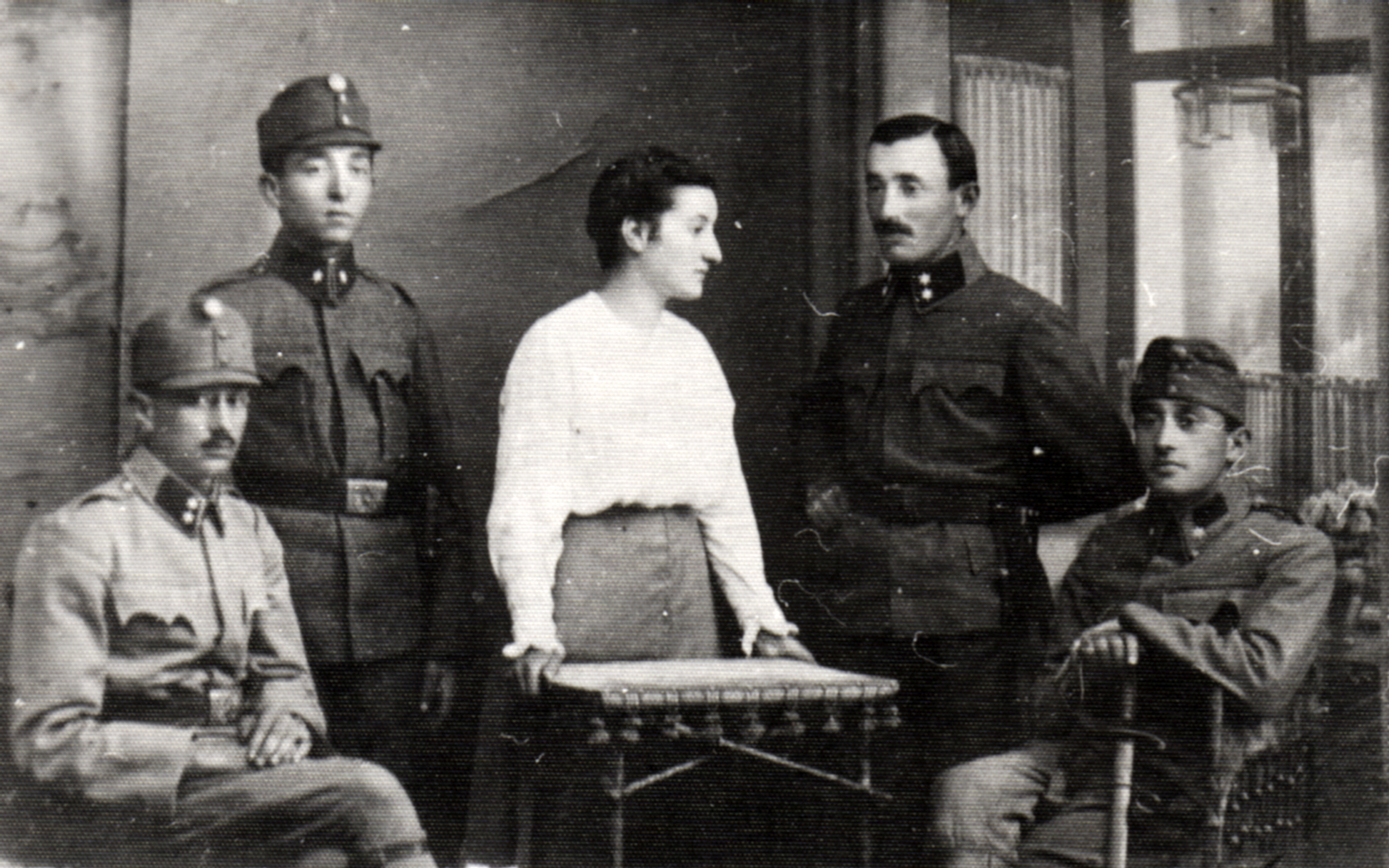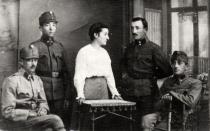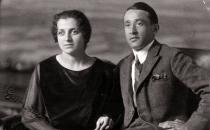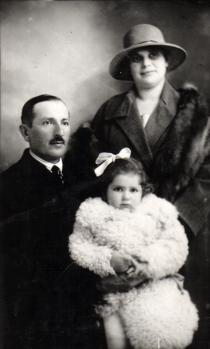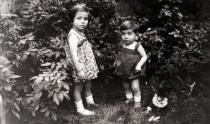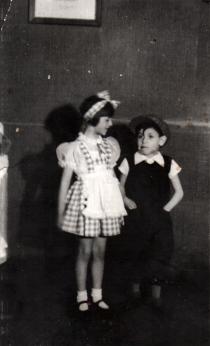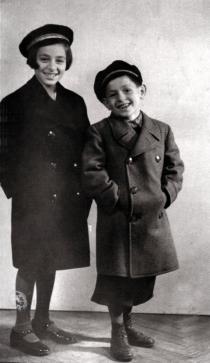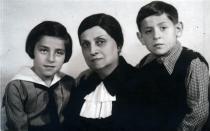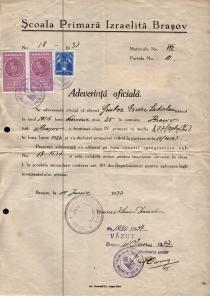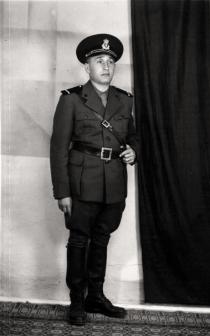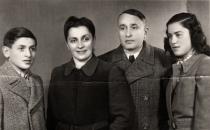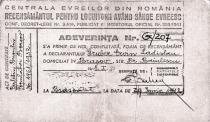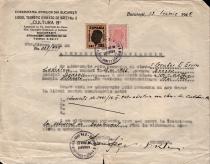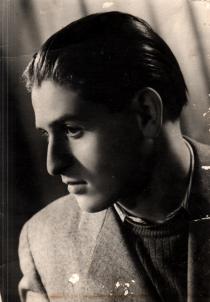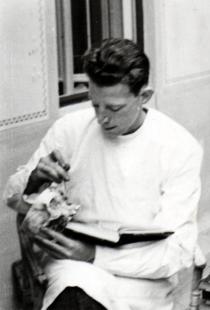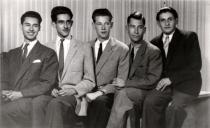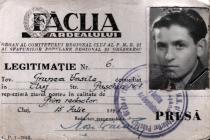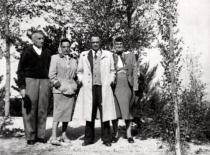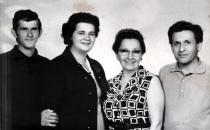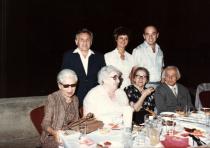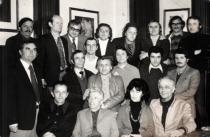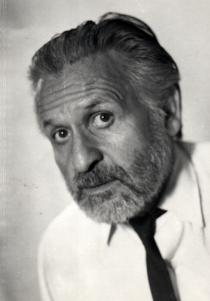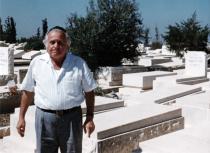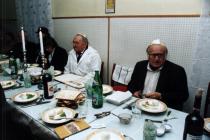I think that this photo was taken in Bethlen in 1916. The man sitting on the right, whose sword is visible, is my father Emanuel Gruber. Standing next to him is my uncle Marton Gruber. The second on the left, the youngest man, is Hershi Gruber, who vanished during a battle in World War I. The first man on the left is Samu Gruber. There are two officers and two warrant officers on the photo, the ones with two stars on the collar are the warrant officers. My father was an officer, which can be seen from his sword, as only officers could have a sword and you can see his on the picture. I think that at that time he was still a volunteer.
There were six boys in the Gruber family, two of them didn't participate in World War I because they were too young. As far as I know, they joined the forces in Beszterce, and they may have come to Bethlen on a short leave. The lady is one of my aunts, but I can't tell exactly which one. I got this photo when my father was no longer alive, so I couldn't ask him about these things. From the window that you can also see I guess that the photo was probably taken on the porch of their house.
Just before World War I my father was accepted to the Medical Faculty, even though he was a Jew, and he finished two years. He should have become a military doctor in the KuK, the Kaiserlich und Koniglich, army, that is, the Austro-Hungarian army, but World War I broke out in the meantime. He went to the front as a voluntary sanitary officer and spent almost four years there, from 1914 to 1918. He came home in 1918 and got involved in politics and promoted Zionism. I think that he received his first impulse at the front, mainly from a colleague of his, who had studied in Vienna. There was a doctor called Ritter there, who was one of the heralds of Zionism and my father came into contact with the Zionist movement through him.
Uncle Marton was a year younger than my father. He was a baker. He was a lower officer in World War I and it was told in the family that he was responsible for protecting the hall where the first Zionist, that is, Jewish national, meeting took place in 1918 in Kolozsvar. They rented the hall of the Urania Movie Theater - it was at the beginning of Horea Road [in the center of town] - for the meeting. The meeting caused a stir, Uj Kelet, one of the most serious Zionist national newspapers published in Hungarian in Romania, was founded after this meeting; at first it was a weekly but later it became a daily. It had correspondents in bigger towns, and it even had permanent correspondents in Bucharest. Zionism led to the creation of the newspaper Uj Kelet and Uj Kelet created Zionism in Transylvania. Marton emigrated to America with his wife; the other siblings had not been married before they left. My guess is that when one sibling settled there, he arranged a visa for the next one so that he could also enter America. That's why they didn't emigrate together but one after the other. I think Marton made aliyah in 1968, he left New York for Nahariya, a town not far from Haifa, where he lived as a pensioner; he died there and is buried there, too. His wife was a Buchwald girl and a very religious woman. Marton's wife was probably the most religious member of our entire family. I don't know how religious she was in her spirit, but she certainly observed all the outward forms of religiosity. They didn't have any children.
Hershi, born in 1895, was my father's closest brother. He finished secondary school before World War I, was drafted into the army - I think he was second lieutenant - and disappeared in a battle in Galicia in World War I. He was at the same front as my father, who was a sanitary officer in an artillery unit, while Hershi was in the infantry. The two brothers met before a battle and Hershi disappeared after the battle. We don't know anything about him ever since, he was not declared dead but was reported missing. I was named Zvi after him because Zvi is Hersh in Yiddish, so my name commemorates his name.
Samu Gruber, born in 1897, was a confectioner. His wife was Jewish, and as far as I know, they had two daughters. There was a fire in a summer cottage somewhere near New York and one of his daughters died there tragically, the poor thing. Samu died in the 1960s.
